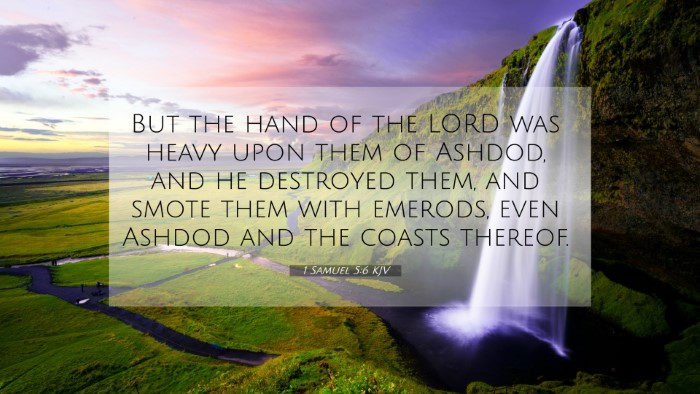Understanding 1 Samuel 5:6
Verse: 1 Samuel 5:6 - "But the hand of the Lord was heavy upon them of Ashdod, and he destroyed them, and smote them with emeralds, even Ashdod and the coasts thereof."
Summary and Interpretation
This verse highlights the consequences faced by the Philistines after they captured the ark of God. With bold imagery, it illustrates God's judgment on a people who acted in defiance of His sovereignty.
Commentary Insights
- Matthew Henry: Henry emphasizes the principle that God’s presence is a source of either blessing or curse, depending on the recipient's relationship with Him. In this historical context, the Philistines, due to their arrogance and pagan practices, faced God’s wrath.
- Albert Barnes: Barnes points out that the "hand of the Lord" signifies divine intervention, indicating that the misfortunes that befell the Philistines were not mere coincidences but rather the result of the Lord's direct action against them in response to their disrespect for the holy ark.
- Adam Clarke: Clarke elaborates on the reference to "emeralds," suggesting that interpretations of this term may refer to tumors or some form of plague. This detail conveys the serious and physically debilitating consequences the Philistines faced.
Bible Verse Connections
- 1 Samuel 4:10-11: The initial defeat of Israel by the Philistines and the capture of the ark set the stage for the events that unfold in chapter 5.
- Exodus 30:12-15: God’s laws regarding the sanctuary and the care of holy objects underscore the sacredness associated with the ark, leading to severe repercussions for its profanation.
- 1 Samuel 6:19-20: The example of the men of Beth Shemesh who looked into the ark reinforces the theme of reverence required when dealing with holy things, reflecting the seriousness of God's holiness.
- Psalm 105:15: “Touch not mine anointed, and do my prophets no harm,” echoes the protective nature of God over His sacred items and people.
- Isaiah 66:24: A vision of God’s ultimate judgment relates to those who do not honor Him, highlighting the importance of obedience and respect towards God’s holiness.
- Jeremiah 10:5: This verse reminds us of the futility of idols, as the Philistines faced calamity while trusting their own gods in opposition to the God of Israel.
- Acts 5:1-11: The consequences for Ananias and Sapphira provide a New Testament parallel of the seriousness with which God regards integrity and respect for His authority.
- Hebrews 10:31: “It is a fearful thing to fall into the hands of the living God” resonates with the theme of accountability and reverence due to God’s power, as illustrated in the narrative of the Philistines.
- Revelation 16:10-11: A description of divine judgment in the end times provides a forward-looking perspective on the seriousness of defying God.
Significance of Cross-Referencing
By engaging with cross-referencing Biblical texts, one can uncover deeper meanings and thematic connections within scripture. Tools for Bible cross-referencing, such as concordances and personal study methods, allow readers to understand the relationships and dialogues between different verses and themes across both Testaments.
Tools for Bible Cross-Referencing
- Utilizing a Bible concordance to find themes and terms.
- Employing a Bible cross-reference guide to assist in linking verses.
- Engaging in cross-reference Bible study for deeper comprehension.
- Learning how to use Bible cross-references effectively in personal studies.
- Understanding the Bible cross-reference system to enhance verse analysis.
- Exploring cross-referencing Bible study methods for enriched understanding.
- Using Bible reference resources readily available in print and online.
- Consulting Bible chain references to track thematic explorations.
- Investigating comprehensive Bible cross-reference materials for in-depth study.
In conclusion, 1 Samuel 5:6 serves as a vital reminder of the nature of God’s holiness and the profound implications of human actions in relation to divine authority. By integrating tools and methodologies for cross-referencing, students of the Bible can enhance their understanding of scripture and its interconnectedness across different books and themes.












